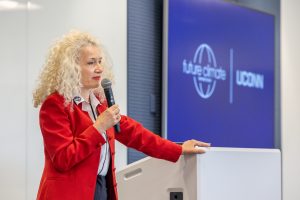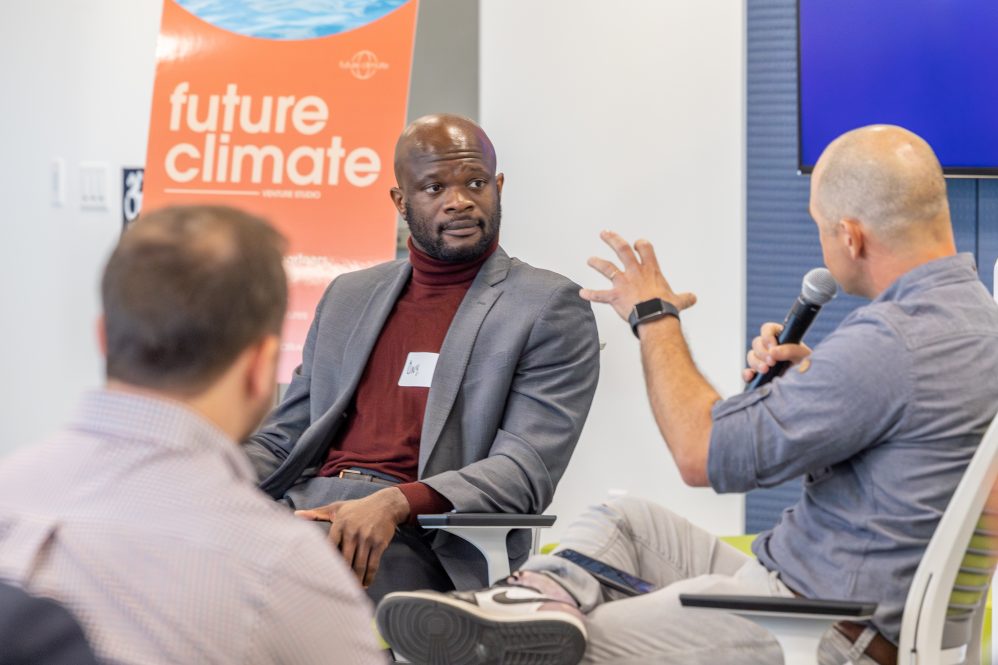Responsible, climate-friendly business practices aren’t merely part of mission statements to the six companies of UConn’s new Future Climate Venture Studio. The cohort is merging successful entrepreneurship with products and services focused on sustainability and social justice.
The CEOS of the various companies made their pitches to investors and researchers on Thursday, April 20. UConn partnered with R/GA Ventures and CTNext to launch the six-company cohort in February, the latest of the University’s investments and initiatives as a leader in climate change and clean energy research.
Technology Commercialization Services (TCS) – a branch of the UConn Research enterprise – hosted the event at the Innovation Partnership Building (IPB). The Future Climate Venture Studio is a major initiative for UConn and its partners, seeking to support and collaborate with business startups that are meeting the challenges posed by climate change.
The companies are headquartered throughout the United States and Canada. Connecting with UConn allows them access to the University faculty’s growing expertise across many disciplines. However, this was the first time that the companies had pitched their concepts and products.

UConn President Radenka Maric has make sustainability and clean energy research a hallmark of her administration, including pledging the University toward a goal net zero carbon emissions by 2040. In welcoming the companies and attendees, she encouraged all parties to “lead with the belief that by working together, we make a difference.”
“Climate change is not only technical issues and how far we push technology. It’s also human wellbeing,” Maric said. “We cannot solve the problem as a nation if we don’t work and collaborate globally.”
Cody Simms, the Studio’s investor-in-residence and host of the “My Climate Journey” podcast, emceed the event. He sat down with CTNext Executive Director and UConn alum Onyeka Obiocha ’12 (CLAS) for a “fireside chat” exploring themes related to entrepreneurship and climate justice.
CTNext is the state agency dedicated to public-private partnership that will catalyze Connecticut’s innovation ecosystem. In addition to utilizing “the most educated workforce” in the country, Simms and Obiocha agreed it’s time for the state and private investors to put some serious funding into climate initiatives and entrepreneurship.
Obiocha also advocated for working with partners like UConn’s Technology Commercialization Services, as well as other universities and organizations throughout the state, to continue to enable new opportunities for tech and climate startups. The intersection of social justice with climate is a key component, and attracting jobs and talent to Connecticut is huge, Obiocha said.
“We’re really trying to build on-ramps so that everyone has a place in the innovation ecosystem that we’re building,” Obiocha said. “If folks don’t see themselves in it, if they don’t see themselves in the climate change solutions from a technology level, then they’re not going to be really trying to change their mindset, skillset, or behaviors to be a part of it in a way that I think we all need to.”
The breadth of opportunities that climate justice presents is diverse, as evident by the pitches of the company CEOS. While some focused on products like advanced bioplastics, others explored themes of food insecurity, improved building practices and technology, and even responsible investing as means to both advancing the planet and turning a profit. The companies include:
- Applied Bioplastics (Austin, Texas): Among other goals, the company seeks to replace traditional plastics and composites with decarbonized bioplastics, offering a much more climate-conscious product that does not sacrifice strength or integrity.
- Clean Crop (Holyoke, Mass.): A food supply business that uses technology to increase harvest yields, decrease waste, and broaden the supply of safe and nutritious products.
- Cool Amps, (New Haven): a Connecticut-based company focused on battery technology, the company recycles metals such as cobalt to apply to new products, in the process mitigating human rights concerns related to mining in developing countries.
- GreenPortfolio (New York City): A tech company developing apps and services designed to maximize portfolios for Millennials and other consumers through sustainable, globally responsible investments.
- INOVUES (Houston): A building retrofitter that replaces facades with energy-efficient glass, reducing energy consumption through window upgrades.
- Urban Stalk (Hamilton, Ontario, Canada): Operating on the Circular Economic doctrine, the company applies groundbreaking agricultural technology to products, ensuring a local supply chain of produce that reduces waste and mitigates food insecurity.
IPB Executive Director Emmanouil “Manos” Anagnostou said that UConn would continue to work with its partners and that the past three months are leading to pathways forward.
“You will be the example as to how we can grow at UConn in terms of entrepreneurship and innovation in the climate change area,” Anagnostou said.
The Future Climate Venture Studio announced it was beginning to seek its second cohort of companies. An application is available online at futureclimateventurestudio.com.



